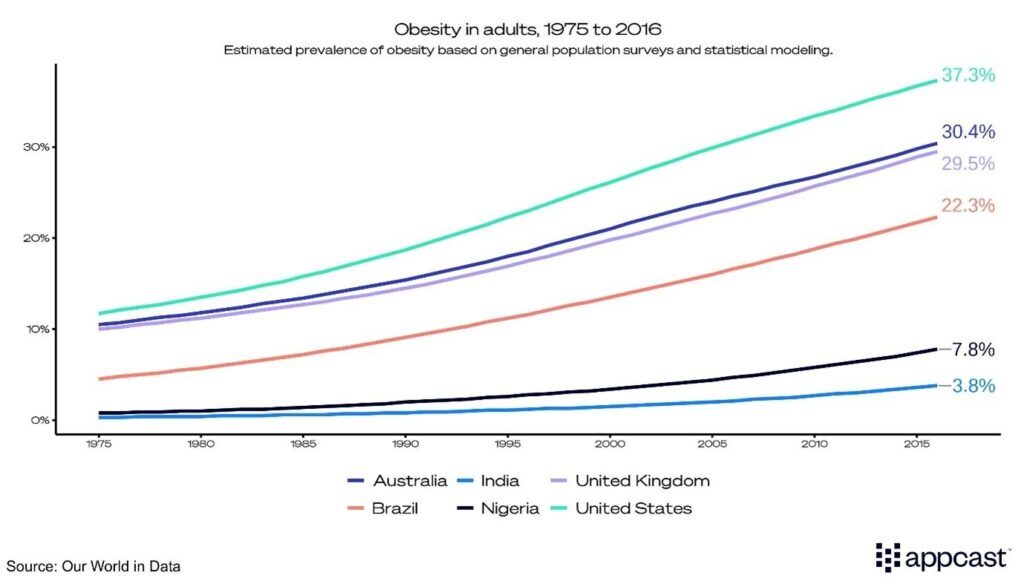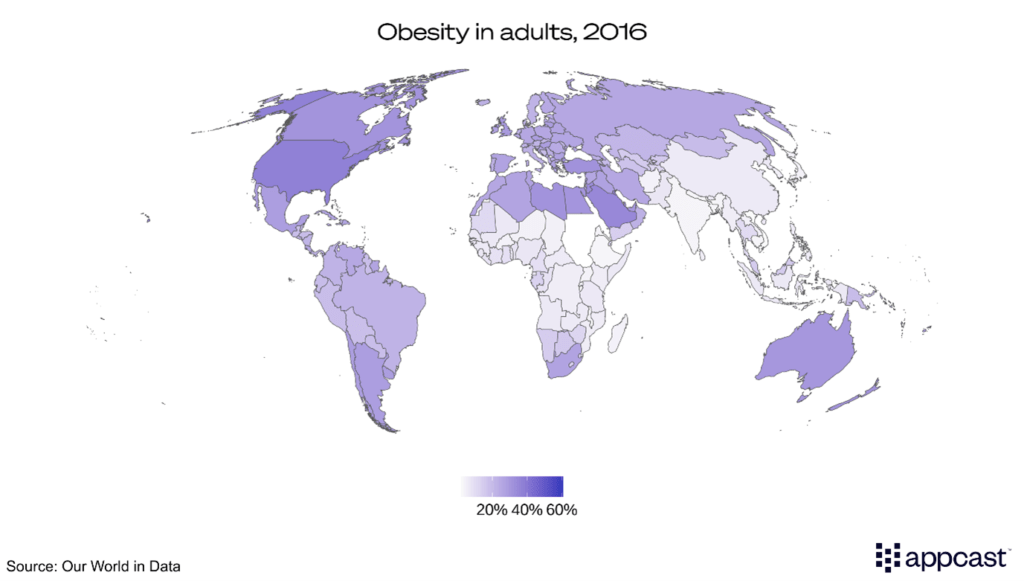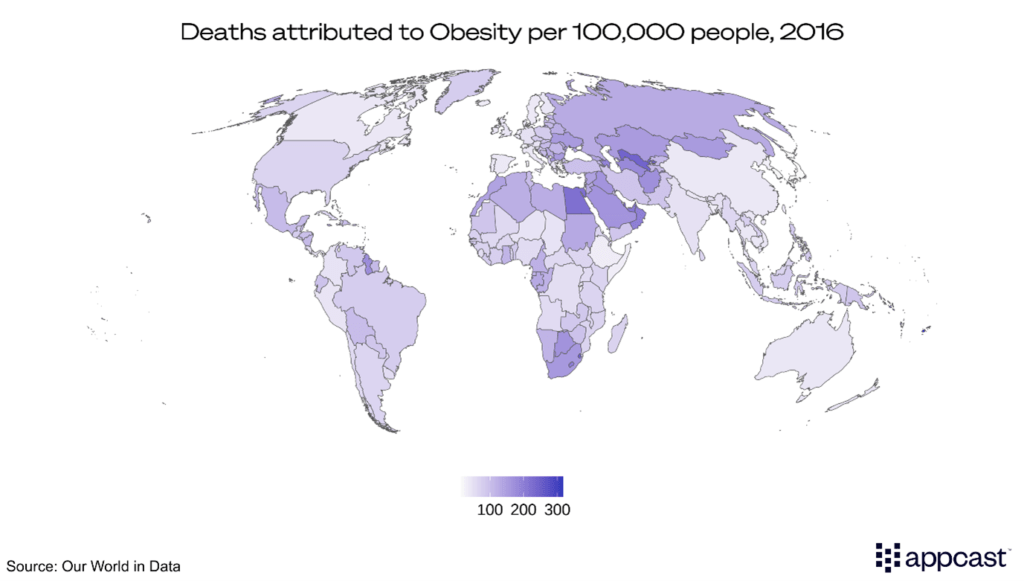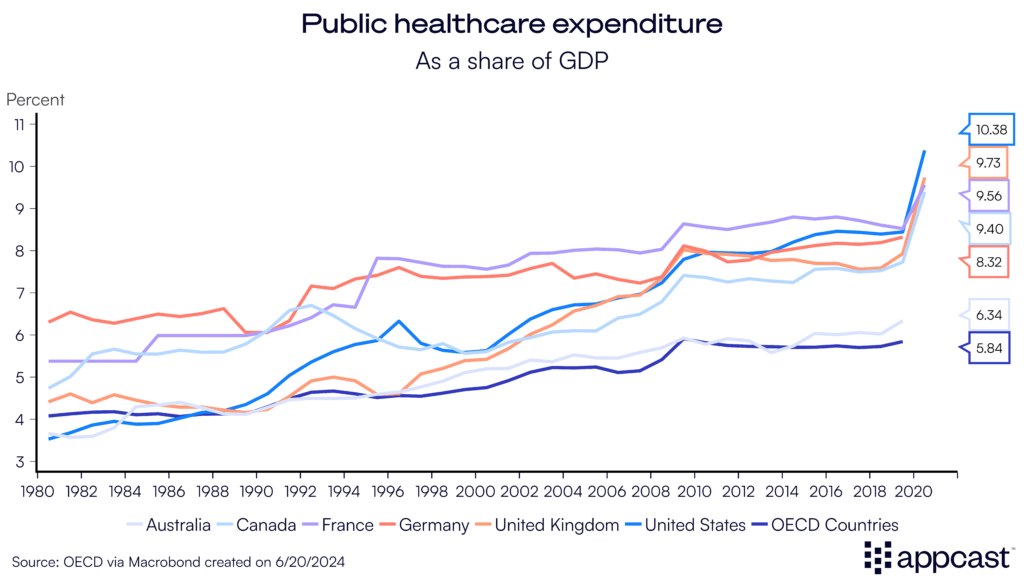The obesity epidemic is spreading
The obesity epidemic has become one of the most severe health crises of today. Using the Body Mass Index (BMI) as a metric, obesity rates have increased from about 10% in the mid-1970s across advanced economies to more than 20% in countries like France and Italy, more than 25% in Australia and the U.K., and more than 35% in the U.S.

Our modern lifestyle is probably to blame. Office jobs often mean high levels of inactivity. This, as well as the intake of ultra-processed food, fast food, sugary drinks, and so forth, has led to rising obesity across the globe.
While the problem is especially severe in high-income countries, lower-income economies are not immune. Rising living standards have correlated with increased calorie intakes all over the world. In emerging markets, most people now have an adequate standard of living that allows them to get by. Fast-food chains and processed food that are available in the U.S. or Europe can also be found everywhere else today. Obesity rates have therefore crept up in emerging markets as well.

The healthcare problems associated with obesity
There are obviously various health problems associated with obesity. These include an elevated risk of diabetes, cardiovascular complications such as coronary artery disease, joint problems like osteoarthritis, sleep apnoea, higher susceptibility to certain cancers like breast and colon cancer, digestive disorders including fatty liver disease, kidney diseases, depression; the list goes on.
The share of deaths attributed to causes where obesity is an attributed risk factor is rising across countries and estimated to be twice as high as back in 1990.

The economic impact of obesity
In recent years, the rising incidence of obesity has become a significant public health concern with far-reaching economic implications. The OECD’s Strategic Public Health Evaluation Plan provides a detailed framework to understand these impacts. This analysis explores how higher disease incidence, particularly obesity, adversely affects labor supply, long-term GDP growth, and fiscal health.
Obesity and workforce dynamics
The effects on the workforce are multifaceted. One of the most direct impacts of rising obesity is on labor force participation. Chronic conditions associated with obesity, such as diabetes and heart disease, often force individuals to leave the workforce prematurely.
Obesity also contributes to higher unemployment rates. Employers may be reluctant to hire individuals with higher health risks due to anticipated higher absenteeism and lower productivity. This bias further reduces the labor pool and exacerbates unemployment issues.
Even when obese individuals remain in the workforce, their productivity is often compromised. Obesity leads to higher rates of absenteeism due to frequent medical appointments and illness. Moreover, presenteeism—where employees are physically present at work but less productive due to health issues—is also a concern.
Furthermore, as obesity rates climb, so do associated mortality rates. The combined effects of reduced labor force participation, increased unemployment, and lower productivity are decreasing the economy’s productive capacity substantially, creating a significant drag on economic growth.
OECD research suggests that individuals with at least one comorbidity from obesity are 8% less likely to be employed in the following year and, if employed, are up to 3.4% more likely to be absent or less productive. Moreover, obesity and its related conditions are reducing the level of GDP by about 3% across OECD economies, a sizable reduction in per capita incomes.
Public health expenditures have surged in recent decades
Managing obesity and its myriads of associated health complications is costly. Public healthcare spending has already increased by several percentage points of GDP across advanced economies in recent decades (the surge in 2020 is obviously related to the COVID-19 pandemic, which has exacerbated the surge in healthcare costs).

About one percent of total tax revenue is spent on obesity, straining public resources and diverting funds from other critical areas. Governments face a dual challenge: higher spending on healthcare and reduced tax revenues from a shrinking or less productive workforce. This dynamic creates a substantial fiscal burden, leading to higher deficits and debt levels.
Weight loss drugs can boost labor supply and growth
The direct consequence of diminished employment and declining labor productivity as a result of the obesity crisis is therefore slower economic growth. All of this implies, obviously, that a solution to the obesity epidemic could reverse these negative outcomes.
That is where new weight loss drugs like Ozempic and Wegovy come in. Public awareness of these drugs is high, approximately 1 in 8 U.S. adults (12%) have taken medications for weight management or related health conditions. Data suggests that some 25,000 Americans start using Wegovy each week even though the drug is extremely expensive. The increased demand for these medications has led to global supply shortages, reflecting their popularity and widespread use.
If the boom in weight loss drug usage persists, advanced economies will be able to undo some of the increase in obesity that occurred between the early 1980s and today. This, in turn, would boost labor supply, reduce absenteeism and increase productivity. Weight loss drugs could therefore provide a boost to the labor force and GDP in the decade to come.
Reversing the 3% negative level effect within one decade (that the OECD has estimated is caused by obesity) could boost annual GDP growth by about 0.3 percentage points, a relatively sizeable growth effect.
Conclusion
The rising incidence of obesity presents a clear danger to people’s health, and by extension, the labor market, and the economy as a whole. By pushing people out of the workforce and increasing public health expenditures, obesity can impose a heavy toll on long-run economic growth.
Luckily, it increasingly looks like medical innovation can help. Millions of people have started to take weight loss drugs and the results are very encouraging. That’s not to say that we should stop encouraging healthy, balanced eating, regular activity and exercise, and adequate sleep, but weight loss drugs could certainly accelerate results in the short-term.
Addressing the obesity crisis requires a substantial effort from policy makers and the public healthcare system. The economic impact of weight loss drugs and other innovations that erase the impacts of other maladies will not be immediate. But in the long run, they are able to push hundreds of thousands of people back into the workforce and boost GDP by several percentage points.
Recruiters should consider encouraging leadership to incorporate weight loss drugs and comprehensive healthcare schemes into employee benefits, since they can have profound positive effects on both individual health as well as employee productivity. This approach not only supports the well-being of their workforce but also enhances the economic performance of their employees and therefore benefits their companies.







